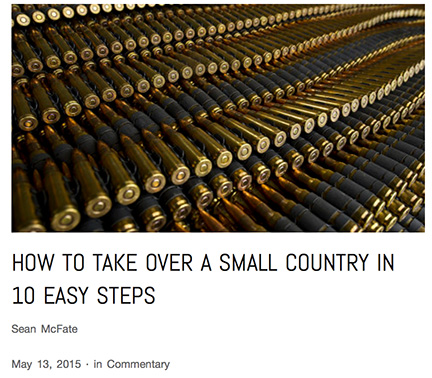
There is a nicely done satire by Sean McFate on how to take over a small country. Check it out here. Note: Only the rich may apply.

There is a nicely done satire by Sean McFate on how to take over a small country. Check it out here. Note: Only the rich may apply.
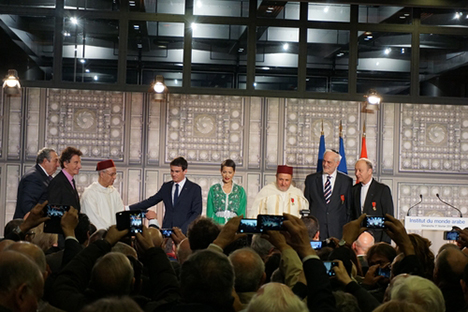
I had the great honor of attending the presentation and celebration of my friend Serge Berdugo’s book project on the rehabilitation of Jewish cemeteries in Morocco. The event took place at the Institut du Monde Arabe, a magnificent cultural center dedicated to highlighting the cultures of the Arab world. The Institute is headed by the exuberant socialist intellectual Jack Lang, who served as France’s minister of culture throughout much of the 1980s and twice as minister of education in the 1990s and early 2000s.
Ministers, ambassadors, rabbis, imams, bishops, intellectuals, diplomats and many others came together to celebrate Morocco’s millennial Jewish history, the country’s diversity, and many other virtues that single out Morocco in the region and, in some cases, the world.
Following the presentation of the book, three French Moroccans—an imam, a rabbi, and a bishop—all practicing in the same district of Évry, a suburb of Paris, were awarded medals of honor by the King of Morocco through his sister, Princess Lalla Meriem. It was during this moment that France’s Prime Minister, Manuel Valls, a man who has been in the limelight following the recent terrorist acts in Paris, walked to the podium, condemned all forms of discrimination, and then proceeded to explain the badly misunderstood concept of laïcité (which approximates the American idea of secularism) by showcasing the three men of god who were being honored as perfect examples of why laïcité protects freedom of religion by keeping the government out of people’s private faiths.
It is often said that France went too far with its anti-clerical revolution, but Valls gave his nation’s ideology—laïcité—a decidedly Jeffersonian meaning.
Bravo.
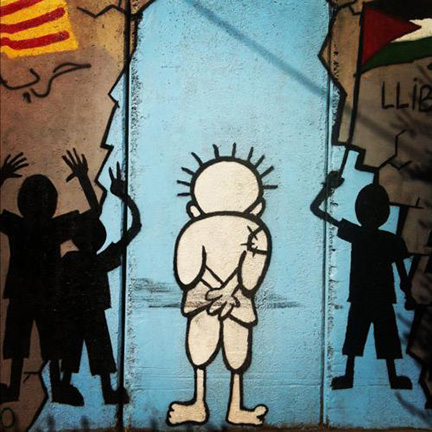
Image by Naji al-Ali. Painted on the Palestinian side of the separation barrier close to Bethlehem.
by Ammiel Alcalay, Warscapes,
August 11, 2014,
You know as well as I do that a people under occupation will
be unhappy, that parents will fear for the lives of their precious children,
especially when there is NOWHERE TO HIDE.
You know as well as I do that a husband’s memory of his wife forced to
deliver their child at a checkpoint will not be a happy one. You know as
well as I do that the form of her unborn child beaten to death in the womb
will never leave a mother’s mind. And you know as well as I do that a girl will
have cause to wonder at the loss of her grandfather, made to wait on his
way to the hospital, and she’ll have cause to cry at the bullet lodged
in her brother’s head — You know as well as I do that watching
someone who stole the land you used to till water their garden
while you hope some rain might collect to parch your weary throat
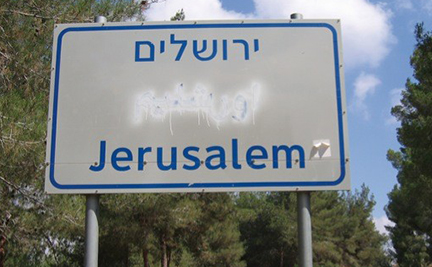
The Irony of Erasing Arabic
Making Hebrew Israel’s Only Language Ignores History
By Liora R. Halperin, Forward, October 06, 2014
In late August, a group of Knesset members from the right flank of the Likud party, Yisrael Beiteinu and the Jewish Home party proposed a bill that would make Hebrew the only official language of Israel, annulling a requirement in existence since the British Mandate period that all official documents be published in Arabic as well as in Hebrew. Similar bills to eliminate or demote the official status of Arabic were proposed in 2011 and 2008. Critics have pointed out that this bill is part of a broader effort to affirm the “Jewish†character of the state (as opposed to its democratic character) by enshrining Jewishness into Israel’s basic laws. Israeli President Reuven Rivlin, for one, has spoken out against it.
A historical perspective is worth adding to the discussion, one that highlights a contradictory Zionist view of language that has existed since the British ruled Palestine: As Zionists advocated forcefully for the very principle of national language rights, they fantasized about a society in which there would be no national competitors to Hebrew. Israel still is navigating between these two positions. Continue reading Making Palestinian Arabs invisible
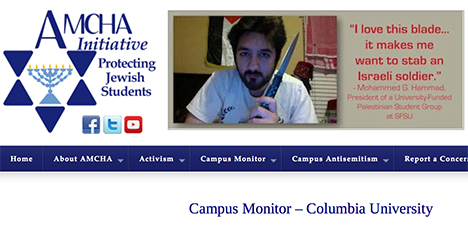
Statement by Jewish Studies Professors in North America Regarding the Amcha Initiative
Forward, October 1, 2014
We the undersigned are professors of Jewish studies at North American universities.
Several of us have also headed programs and centers in Jewish studies. Many of us have worked hard to nurture serious, sustained study of Israeli politics and culture on our home campuses and elsewhere.
It is in this latter regard that we call attention to the activities of an organization called the AMCHA Initiative whose mission is “investigating, educating about, and combatting antisemitism at institutions of higher learning in America.†Most recently, AMCHA has undertaken to monitor centers for Middle Eastern studies on American campuses including producing a lengthy report on UCLA’s in which that center is accused of antisemitism.
AMCHA has also circulated a list of more than 200 Middle Eastern studies faculty whom it urges Jewish students and others to avoid because, it asserts, they espouse anti-Zionist andeven antisemitic viewpoints in their classrooms.
It goes without saying that we, as students of antisemitism, are unequivocally opposed to any and all traces of this scourge. That said, we find the actions of AMCHA deplorable.
Its technique of monitoring lectures, symposia and conferences strains the basic principle of academic freedom on which the American university is built. Moreover, its definition of antisemitism is so undiscriminating as to be meaningless. Instead of encouraging openness through its efforts, AMCHA’s approach closes off all but the most narrow intellectual directions and has a chilling effect on research and teaching. AMCHA’s methods lend little support to Israel, whose very survival depends on free, open, and vigorous debate about its future. Continue reading Exposing Amcha
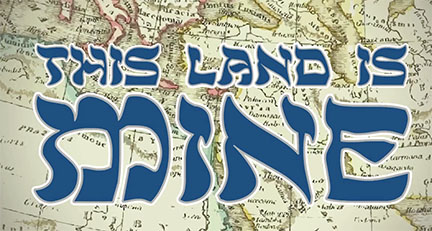
There is an extraordinary cartoon video on Vimeo that gives the historical background to the current battle in Gaza. Check it out here. And God bless Andy Williams.

By Sheila Carapico, Middle East Research and Information Project, July 1, 2014
* This memo was prepared as part of the “Ethics and Research in the Middle East†symposium
American political scientists studying the Middle East face ethical dilemmas not shared by most of our disciplinary colleagues. Sometimes – perhaps unexpectedly – our presence in countries or communities experiencing repression and/or political violence puts our local colleagues, hosts, or contacts at risk by association. The massive U.S. military footprint and widespread mistrust of U.S. policies and motives multiplies the risks to our interlocutors.
The trademark methodology of American Arabists is fieldwork, meaning, in political science, in-depth interviews, participant observation, data collection, document-gathering, opinion polling, political mapping, and recording events. As sojourners but not permanent residents, we rely heavily on the wisdom, networks, and goodwill of counterparts “on the ground,†particularly other intellectuals.
In any environment where agencies of national, neighboring, and U.S. governments are all known to be gathering intelligence, our research projects may look and sound like old-fashioned espionage. Even under the very best of circumstances (which are rather scarce) a lot of people are wary or suspicious of all Americans, including or sometimes especially Arabic speakers who ask a lot of questions and take notes. Immediate acquaintances probably grasp and trust our inquiries. Their neighbors or nearby security personnel may not. It is common knowledge that at least some spies and spooks come in academic disguise and that some U.S.-based scholars sell their expertise to the CIA or the Pentagon. Instead of treating whispered gossip as the product of mere paranoia or conspiracy theories, we need to recognize its objective and sociological underpinnings. Continue reading On The Moral Hazards of Field Research in Middle East Politics
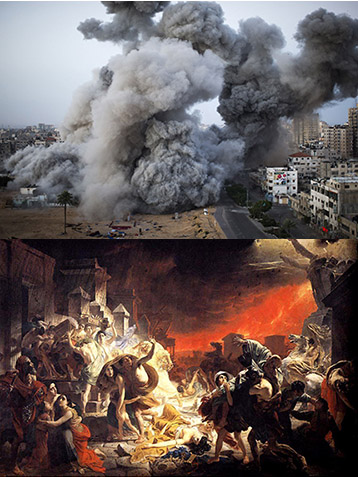
All eyes in the world are on Gaza or at least they should be. The daily deaths and destruction rival the biblical “fire and brimstone” that fell out of the sky on Sodom and Gomorrah. If you think this is an exaggeration, check out this explicit video made by a Guardian crew. Gaza is drenched in biblical symbolism; this is a desolate zone that bleeds tragedy. Here was the ancestral home of the Philistines, an arch enemy of Israel, now transformed into stateless Palestinians trapped in a living hell. Literally trapped, so that there are no safe houses, even those supposedly sanctioned by the United Nations. As you read this commentary, it is likely that somewhere in Gaza someone is being killed, blown to pieces by a bomb (labeled “made in the USA”) or maimed for life, and a short and miserable life at that.
The Bible is a book full of prophecy, but then there are those stories that have such a déjà vu quality that it takes the breath away. Consider this King James Version passage from I Samuel 18:6-7:
And it came to pass as they came, when David was returned from the slaughter of the Philistine, that the women came out of all cities of Israel, singing and dancing, to meet king Saul, with tabrets, with joy, and with instruments of musick. And the women answered one another as they played, and said, Saul hath slain his thousands, and David his ten thousands.
Of course, the KJV is now four centuries old, so it always needs to be translated into contemporary terms. So perhaps this would fit the current Gaza better: Continue reading Gaza, and Bibi hath slain…